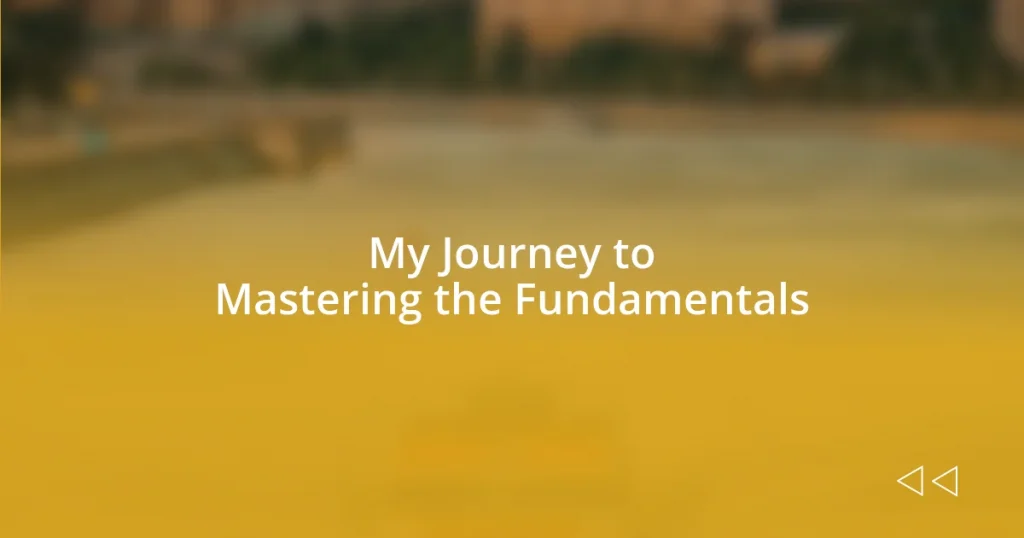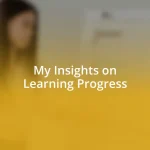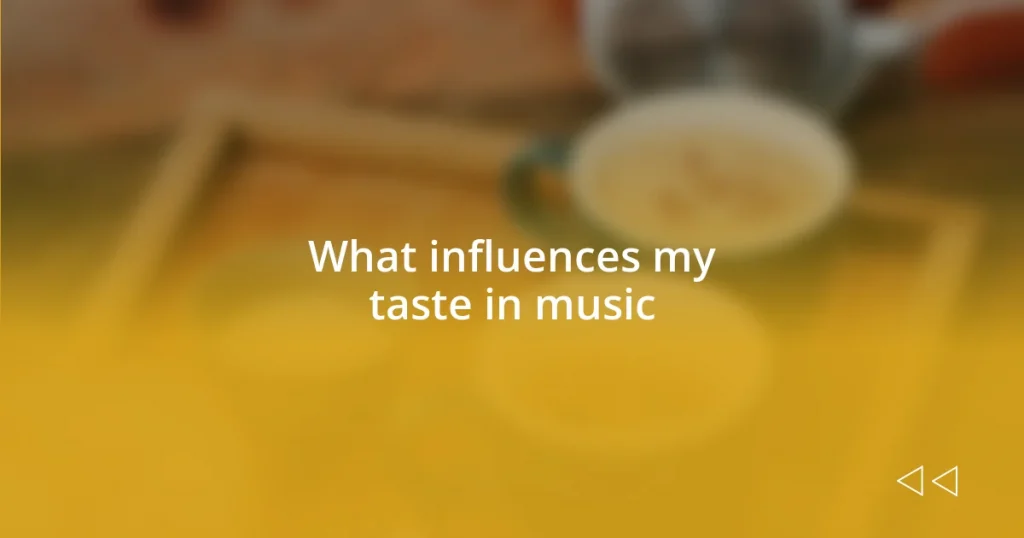Key takeaways:
- Mastering fundamentals is essential across disciplines; they lay the groundwork for skill development and creativity.
- Creating a structured learning plan helps set clear goals and manage progress, making learning more effective and enjoyable.
- Sharing knowledge through teaching reinforces understanding and fosters collaboration, leading to personal growth for both the teacher and the learner.

Understanding the fundamentals
Understanding the fundamentals is like laying the groundwork for anything you want to achieve in life. I remember when I first tried to learn a musical instrument; it was frustrating at first. I often asked myself, “Why is this so hard?” but soon realized that mastering scales and basic chords was crucial for playing the songs I loved.
Reflecting on my journey, I’ve seen that these core principles apply across various fields, not just music. Whether it’s in sports, business, or even in personal relationships, a strong grasp of the fundamentals creates a solid foundation. I can’t count how many times I stumbled because I overlooked these basics, often leading to setbacks that could have been avoided.
It’s fascinating to think about how these essentials can remain constant, yet take on new forms as we advance. For instance, I used to see them as mere steps, but now I recognize them as powerful tools for unlocking creativity and deeper understanding. Have you ever felt that moment when everything clicks because you finally got the basics down? That satisfaction is truly worth the effort it takes to master them.

Identifying key skills to master
Identifying the key skills to master is crucial for anyone embarking on a journey of learning. When I started learning to code, I initially thought I’d just dive into complex algorithms. However, I quickly realized that understanding basic programming principles and syntax was key. It felt overwhelming at first, like trying to figure out a puzzle with pieces scattered everywhere, but once I focused on these fundamentals, everything started to fall into place.
Here are some key skills I believe are essential to master in any field:
- Fundamental Techniques: Emphasizing the core practices specific to your discipline, such as basic scales in music or foundational math concepts in coding.
- Critical Thinking: Developing the ability to analyze problems systematically and devise effective solutions, which is critical in both creative and technical fields.
- Time Management: Learning to prioritize tasks and manage your time efficiently can significantly accelerate your progress in mastering any skill.
- Adaptability: Embracing change and being open to learning new methods as you grow.
- Communication Skills: For collaboration in any environment, the ability to convey your thoughts clearly is invaluable.
As I navigated through learning these skills, I often felt a mix of excitement and frustration. There were days when it seemed like I was making no progress at all, yet in those moments of struggle, I learned more about resilience and perseverance than from any tutorial. Those experiences remind me of the value of having a solid skill set—it not only builds confidence but also equips you to tackle challenges head-on.

Creating a structured learning plan
Creating a structured learning plan is crucial for transforming chaos into clarity. I remember when I attempted to learn graphic design; without a roadmap, I was all over the place, jumping from one tutorial to another without truly comprehending the core concepts. Crafting a plan not only helped me set goals but also made the learning journey feel manageable and less intimidating, allowing me to celebrate small victories along the way.
A structured learning plan should include specific goals, a timeline, and measurement of progress. I vividly recall breaking down my goal of mastering Adobe Illustrator into weekly objectives. Each week focused on a different tool or technique. This approach kept me motivated and made the complex process feel like a series of manageable steps instead of an insurmountable mountain. Moreover, it’s not just about sticking to the plan; adapting it as you progress can lead to richer learning experiences.
In designing my learning plans, I often integrate rewards for milestones. I recall treating myself to a mini-celebration after completing a challenging project. This not only boosted my morale but also conditioned me to associate hard work with positivity. Do you have a strategy for keeping yourself motivated during your learning journey? I’ve found that incorporating personal reflection sessions helps me navigate through challenges and adjust my plan as needed, ensuring growth while keeping the process enjoyable.
| Strategy | Description |
|---|---|
| Goal Setting | Defining clear objectives to work towards, keeping focus on what matters. |
| Progress Tracking | Monitoring achievements over time to maintain motivation and adaptability. |
| Rewards Systems | Incorporating celebrations for reaching milestones to reinforce positive behavior. |
| Reflection | Regularly assessing what works and what doesn’t to keep improving your learning plan. |

Consistent practice and application
The journey of mastering a skill truly hinges on consistent practice and application. I distinctly remember the hours I spent trying to grasp the fundamentals of coding. At times, it felt repetitive and monotonous, yet every line of code I typed solidified my understanding. The more I engaged with the material, the more my confidence grew. Have you ever found yourself stuck on a concept, only to have it suddenly click after repeated attempts? That moment of clarity is a rewarding payoff for persistence.
There were moments when I felt like I was just going through the motions. However, I learned that mindful practice—really focusing on the “why” behind what I was doing—made all the difference. For instance, while I was learning guitar, I would often practice scales without fully understanding how they applied to playing songs I loved. It wasn’t until I started incorporating those scales into real music that I noticed significant improvement. How can we ensure that our practice isn’t just busywork but genuinely contributes to our growth?
In my experience, establishing a routine can elevate your application of skills to another level. I remember setting aside specific times each week dedicated solely to applying what I’d learned, sometimes even joining online challenges that pushed me to produce something new. Those little commitments transformed practice from a chore into a source of excitement. Have you considered how integrating timely application can enhance your learning process? I found that it not only cements knowledge but also makes the entire journey feel purposeful and rich with discovery.

Overcoming challenges along the way
It’s inevitable; challenges will surface. I remember grappling with feeling overwhelmed while diving into the world of photography. I’d often struggle with the various technical terms and settings on my camera, feeling like I was drowning in details. It was in those moments of frustration that I decided to tackle one concept at a time rather than all at once. This approach reduced my anxiety significantly and helped me gain confidence.
Then there was the time when a crucial project deadline loomed over me, and I felt paralyzed by self-doubt. Have you experienced that nagging voice telling you that you’re not good enough? I certainly have. But instead of succumbing to it, I started sharing my progress with my peers. Their feedback and encouragement fueled my motivation, transforming isolation into a collaborative support system. It taught me the power of community when facing creative hurdles.
Looking back at my journey, it’s clear that setbacks often served as pivotal moments for growth. There were days when I faced a creative block that seemed insurmountable. Yet, I discovered that stepping away from the project—taking a walk or sketching something entirely different—could reignite my imagination. It’s as if the universe was nudging me to relax, allowing my mind to breathe before diving back in. How do you overcome creative blocks? I’ve learned that embracing those challenges, rather than fearing them, ultimately fuels my passion and creativity.

Measuring progress and adjustments
Measuring progress is a critical aspect of mastering any skill. I remember using a journal to jot down my daily reflections while learning to play the piano. Each week, I would assess my progress not just by the pieces I could play, but by the emotions I felt during practice sessions. Did I feel more at ease with difficult passages? Could I express the music better? These insights were incredibly valuable, shaping my next steps and areas to focus on.
Adjustments often accompany the measurement of progress. I once spent weeks working diligently on a specific drawing technique that simply didn’t resonate with me. It wasn’t until I evaluated my practice and recognized this misalignment that I decided to pivot. I swapped techniques, experimenting with styles that felt more intuitive. The moment I made that change was enlightening—I’d underestimated the importance of enjoying the process. Have you ever been caught in a routine that stifled your creativity? I learned that sometimes, stepping back and reassessing can unlock new pathways to growth.
Revisiting my measurement methods was equally essential. When I took up running, I initially tracked my speed, but as I progressed, I discovered the importance of recognizing how I felt during my runs. Was I pushing too hard? What did my body need on different days? Tuning into these signals allowed me toadjust my routines. It made me appreciate that progress isn’t just about numbers—it’s about the journey and understanding myself along the way. Have you checked in with your own feelings about progress lately? Observing those emotional markers can provide insights that pure metrics sometimes miss.

Sharing knowledge and teaching others
I’ve always believed that sharing knowledge is one of the most rewarding experiences, both for the teacher and the learner. One time, I organized a small photography workshop for friends who were eager to learn. As I demonstrated a technique for capturing light, I could see their excitement grow with each click of the shutter. It reminded me that teaching not only reinforces my understanding but also ignites a spark in others. Have you ever witnessed that “aha” moment in someone you’re teaching? It’s truly exhilarating.
In another instance, while mentoring a colleague at work, we had a great back-and-forth about project management techniques. I shared my struggles and successes, but what surprised me was when they pointed out strategies I hadn’t yet considered. This exchange reshaped my approach and deepened my appreciation for collaboration. Teaching isn’t a one-way street; it’s this beautiful cycle of learning from each other. Have you tapped into the collective wisdom of your peers? It can often reveal insights that are just outside your own perspective.
Through these experiences, I’ve learned that the act of teaching is also an opportunity for self-reflection. When I explain concepts to others, I often realize gaps in my knowledge or areas where I can improve. For example, while helping others with camera settings, I discovered a few new tricks that made my own photography workflow smoother. Isn’t it fascinating how sharing what you know can lead to even greater personal growth? It underscores a valuable truth: we never stop learning, especially when we help others on their journey.















